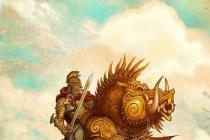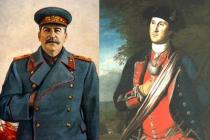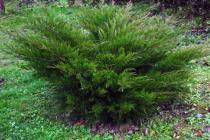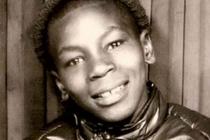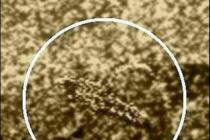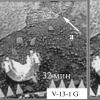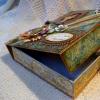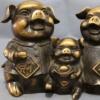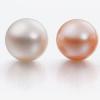God Frey is one of the triad of supreme rulers of Asgard along with Thor and Odin. He is the only one of the trio who is in no way associated with war and conflict. But this is relative, because among the ancient Scandinavians, every man was a warrior, especially in case of danger. Frey was revered as the god of fertility, summer, sun and sunlight. His description is in many ways close to the image of the Slavic Semargl and the Egyptian Set. But Semargl and Seth are the protectors of the Sun, and Frey is its embodiment, personification.
Frey was the custodian of many outstanding artifacts. In particular, he owns the boar Gullinbursti (from Old Norse - “golden bristles”, or, according to another version, “sharp-toothed”). Gullinbursti was created from pigskin thanks to the cunning of Loki, who forced representatives of the two most ancient blacksmith dynasties of Svartalfheim to argue for primacy in their profession. It is believed that Gullinbursti is second only to Sleipnir in speed. Frey can ride Gullinbursti, but more often he simply walks next to him, which emphasizes their friendly relationship. At the same time, the symbol of the god Frey is a boar or wild boar.

Another artifact of the god Frey is Skidbladnir (literal translation - “assembled from tablets”). This is a ship that, if necessary, can fold down to such a small size that it can easily fit into a pocket. Skidbladnir could accommodate the entire army of Asgard (in the “unfolded” state, of course), and its sails were always filled with a fair wind. In addition, the amazing ship of the god Frey can travel not only by sea, but also by land. According to one version, Skidbladnir was created for Frey by the master blacksmiths Ivaldi, according to another, by Dvalin himself, the lord of the dark elves. Initially, the ship could have belonged to Loki, but he gave it to Frey for stealing the hair of Sif, Thor's wife, at the instigation of Freya.
The god Frey had a son named Fjelnir from the giantess Gerd. In the “Saga of the Ynglings” (10th century) it is said that Fjolnir marked the beginning of the dynasty of the Ynglings, the great rulers of the North. Thus, the population of the Scandinavian peninsula (at least the “ruling classes”) are the direct descendants of Freyr from the Vanir clan. Both Frey himself and his son Fjelnir are mentioned in many European chronicles, in particular in the “Acts of the Danes” by Saxo Grammar (though under different names).

According to the Eddic texts, Odin made Frey ruler in Uppsala, where he built the greatest temple and began to rule (according to another version, it was not Frey who ruled in Uppsala, but his father, Njord). Uppsala is one of the oldest cities in Sweden; this region has an ancient and rich history (for a long time Uppsala was the religious and later educational center of the country).
Freyr (as a historical figure) marked the beginning of the so-called "Peace of Frodi", a long period of time that was characterized by a complete absence of wars in the Scandinavian Peninsula. “The Saga of the Ynglings” says that the reign of King Freyr (aka, in all likelihood, Frodi) was marked by rich harvests and a general increase in the well-being of the population. After Frey’s death, his body was secretly buried (for some reason not burned!) by the priests on a certain hill, which, according to legend, “gave” gold, silver and iron for three years.

God Freyr is a unique image. He patronizes peace, hates and despises war, but possesses a weapon of exceptional power - the sword of light. However, as already mentioned, he says goodbye to the sword for the sake of love (probably Gerd can act as a personification of the earth, then Frey is a personification of the sky, and this myth describes a symbolic marriage). This is probably one of the oldest Eddic stories, which still raises a lot of questions.
One of Freyr's most common names is Yngvi. Presumably, it was from him that the famous Scandinavian names (both male and female) came from - Ingvar, Ingeborga, Ingmar, Ingrid. That is, Yngwi is a symbolic eponym, from which the name of the Ingevon group (Germanic tribes of the 6th century BC) mentioned by Tacitus and Pliny probably came from.
One of the well-known and beloved gods of the Northern traditions is the god Frey. The name Freyr means "lord" in Old Norse. He is truly the lord of fertility, sexuality, abundance, prosperity, ancestral power and harvest. Frey blesses not only livestock and crops, but also creative endeavors. Helps in conceiving children and brings good luck to the family as a whole.
Frey is also a mighty warrior. And his symbol, the boar, represents not only fertility, but also strength in battle. The golden boar that Frey owns is called Gullinbursti (golden bristles). Participants in the rituals often sealed the oath by placing their hand behind the back of the sacrificial pig. Among the warriors there were also those who drew their strength not from a bear or a wolf, but from a boar. Boars were often depicted on helmets and weapons to convey the animal’s strength to warriors.
Frey is the only warrior who will have to go onto the battlefield unarmed on the day of Ragnarok, since he gave his sword as a ransom for the giantess Gerd. She became his wife. Frey was considered the progenitor of kings and the Swedish royal dynasty traced their ancestry to him.
Frey has many heyti nicknames. Here are just a few of them: Argud ("God of the Harvest"), Bödfrod ("Wise in Battle"), Bjarth ("Light One"), Diar ("Priest"), Mattug ("Mighty"), Nitum ("Breadwinner") , Fegjafa ("Giver of Wealth") and Folkvaldi of the Year ("Ruler of the People").
Frey is the god of sensual pleasures. The god Odin in Asgard had the highest throne, Hlidskjalf, from which one could observe everything that was happening in the worlds. Odin did not allow anyone to sit on this throne. But one day, when Odin went on a journey, Frey secretly violated this prohibition. And looking at what was happening in the worlds, he noticed that in Jotunheim, the world of giants, there was a beautiful maiden. Love was ignited at first sight, Frey yearned day and night, thinking about the beautiful giantess. He did not drink, did not sleep, exhausted from passion, until Skadi’s stepmother ordered Skirnir, Freyr’s friend and servant, to find out the reason for his poor health. Skirnir obtained an answer and, at Frey’s request, went to Jotunheim to marry Gerd to him. As a reward, he demanded from Frey a horse and a magic sword that fought on its own. His sword - a magical flaming sword that fights of its own free will - is the only defense in the world against the fire giant Surtr. Frey gives his sword to Gerd's father as a bride price, and Gerd's father gives it to Surt. With this sword Surtr will destroy the nine worlds on the day of Ragnarok. The sword that Frey gives to the enemy may symbolize fertility. In the last battle, Frey goes to battle with Surt, armed with deer antlers.
When Skirnir was admitted into Gerd's chambers, she turned out to be unyielding, rejecting Freyr's offer and gifts. Skirnir had to resort to dubious methods of matchmaking. When the proud maiden did not succumb to threats, Skirnir cursed her with the help of three powerful runes and another one - Thurisaz, the most destructive and dangerous rune in all of Futhark. This curse was supposed to instill in her an unquenchable lust, and therefore Anne Groa Sheffield, in her work Freyr: God of the World, suggests that “the magic of runes and potions symbolizes Freyr’s ability to awaken sexual desire.” Whether this is true or not, Gerd agreed to meet Frey in the sacred grove in nine days and nine nights and accepted his offer.
Frey never offended women or treated them badly. He is the god of life force, so abundant that it cannot be contained. At the same time, it gives not only sensual pleasures, but also real joy and happiness.
- the main element is earth;
- additional element - water, air;
- color - reddish brown;
- totem animals - bear, bee, horse;
- hypostasis - horned god;
- magical weapons - sword, deer antlers, ship Skidbladnir;
- the purpose of the appeal is peace and prosperity, removal of shackles, abundance;
- direction of light - west;
- runes for work - Fehu, Yera, Evaz, Inguz, Ansuz.
Frey is the ruler of Alfheim, the world of the light elves who are in charge of plant growth. He is an analogue of the horned god - the patron of fertility. Freyr's main feature is the large erect phallus with which he is often depicted. The Ansuz rune is classified among the Freyr runes, since one of its purposes is to remove shackles. When addressing Frey, as a rule, they also appeal to his twin sister Freya. Frey is the god of the summer sun and the noblest of the gods.
House of Frey
Frey has many houses in different worlds. He has to move frequently. In Asgard, he lives with his sister in the hall of Sessrumnir, and always remains there when he goes to Vanaheim. But he spends time alone, since his wife Gerd does not come to Asgard. In Alfheim, Frey has his own house, donated by the Aesir. Gerd sometimes visits Alfheim, although she feels uncomfortable there too. When Frey returns to his homeland of Vanaheim, he and Gerd live in the forest of Barry, where they first met.
Frey is the god of love, sensitivity, sex. But unlike his sister Freya, all this is important to him only as part of a deeper relationship. He works with stable, stable couples who want to build a home together. And he is even more favorable to those who want to cultivate their own piece of land. Frey is the god of marriage, but unlike the goddess, who blesses only socially acceptable unions, he unites couples about whom people say, shaking their heads: “They will never get along together, they are too different,” “they are very strange.” It's not just heterosexual couples that He blesses. Having chosen the giantess Gerd as his wife, he heard disapproving statements from others. Therefore, he sympathizes with all lovers.
Frey does not tolerate any violence in his sanctuaries and especially not at home. He does not forgive those who start quarrels in their homes. For all his warmth and kindness, he will easily order his servants to throw out those who upset him from his house.
Frey owns the ship Skidbladnir, which is worth a look. This is a tiny model of a sailing ship, which with one word begins to grow and turns into a real ship. This is a gift from Aegir that Frey is proud of. He often goes to sea to show off, but he does not go on long voyages, since he is not such a skilled navigator as his father.
Frey's wife, the giantess Gerd, is completely different from her husband. As much as he is good-natured and sociable, she is just as reserved and cool, and perhaps even cold with strangers. Gerd is tall and large-boned, like most giantesses, pale, with long dark hair, usually braided. She prefers loose dresses that hide her figure and spends most of her time in her gardens. At both houses, which she shares with Frey, she laid out beautiful gardens, which are strictly guarded. When you enter these gardens, there is peace and quiet all around and it seems that the whole world disappears and only this secluded corner remains.
At first glance, Gerd is plain and one can only guess why Frey fell in love with this woman. But when Gerd thaws, a fire lights up in her eyes. And it becomes clear that true Jotun passion is hidden in her. At these moments she becomes both frightening and at the same time desirable. It was as if a domestic cat had suddenly turned into a wild panther. But all this quickly passes and again deep passion hides behind a cold mask.
Frey has a personal servant and assistant, Skirnir, who voluntarily chose to serve him. Skirnir is thin, agile and sharp, insightful, dexterous and sharp-tongued. Behind his wide smile and infectious laugh lies a cunning, resourceful, cool and practical mind. To achieve his goal, he will without a twinge of conscience twist the arms of anyone, although in the presence of Frey he will never resort to such tactics. He takes his vocation as Frey's assistant and bodyguard very seriously and will not tolerate unflattering words from anyone about his master, although he himself can sometimes tease him.
In addition, Frey is served by Beyla and Byggvir, a middle-aged Alf couple. They follow him from house to house. They are said to be handsome goblins, the kind that make up most of the commoners of Alfheim. Beila is something of an archetypal "good farmer" from the fairy world, and her husband resembles a leprechaun in appearance. Beila milks the livestock and raises bees, while Byggvir cultivates the fields, brews beer and takes care of the magical World Mill - one of Frey's precious treasures. Grain flows from the Mill in an endless stream. The types of grain change from day to day, and Byggvir is constantly trying to obtain more and more new varieties. He is quite sociable and will happily show you this wonderful mill - his favorite hobby. Beila is more reserved, but you can win her over by offering to help with housework (this will be easiest if you know how to milk dairy cattle).
Together with Frey, his huge red stallion Blodigofi, who is not afraid of fire, and a pair of tamed boars, which Frey harnesses to his chariot: Gullinbursti (“Golden Bristle”) and Slidrugtanni (“Terrible Fang”), move from place to place.
Summoning Frey
Hail Freyr, lord of the fields!
Hail, lord of the Vanir!
Golden-haired, like a ripe field,
You give wealth to hearts and homes,
Equally humble and noble.
We praise you, O ear, filled with grain:
You rise from the black earth and fall under the sickle, giving us food.
We praise you, O mighty, swift boar,
O phallus that gives life,
O Lord of Love growing from the earth,
Love that is connected by word and common labor,
Love that ripens in labor, like a golden harvest.
Help us understand that love is worth the effort,
And labor is worth love,
And neither love nor work can live without each other.
O Frey, God of Grain,
Husband of the giantess Gerd,
You can warm even a cold heart.
You are an unarmed warrior
Who gave his sword for love.
You are the hope that sleeps in the grain and comes to light in the spring,
Awaken hope in us with the arrival of every spring!
Prayer to Frey
I praise Frey, god of the generous land:
Glory to you, who brings abundance and joy!
May your tenderness, your kindness and passion be glorified!
Glory be to your strength!
May your hands be glorified, bringing life and affection!
Lord of rain, cool wind and fertile fields,
Send grace to my heart, soul and spirit,
Send wealth and peace into my life
Help me create and love!
I will honor you and glorify your name.
Praise be to you, Freyr!
Bread spells in the name of Frey
For anyone who loves Frey, bread baking is a sacred art. On each loaf of bread, bun, flatbread, before placing in the oven, you should cut out the Inguz rune - the Freyr rune, or the double Feha.
Braided breads were originally baked for funeral rites, since in ancient times a widowed woman cut her braid and threw it into her husband’s grave. Nowadays, such breads can serve as a reminder of Yngwie, who sacrifices himself to feed all the hungry.
All other ingredients used in baking are also sacred. Honey is the sacred food of Freya and Frey. Yeast consists of living beings and from these countless lives rises the dough that was once Freyr's body. Milk is a gift from a female animal who has become a mother. It carries the blessing of Audumbla or Heydrun, as well as Beila, the divine thrush. Eggs are symbols of the Sunnah. Fragrant herbs are a gift from Gerd, Freyr's wife. And sugar is also obtained from beets.
As you knead the dough, read the prayer out loud:
This is the body of our god,
This is the flesh of the victim
This is the pledge of divine love.
After forming the bread and leaving the dough to rise, read the prayer:
You, troops of yeast, will serve our god:
Carry the coffin with his body,
Raise him high with your breath,
Prepare him for transformation.
After placing the bread in the oven, close the door and say:
Flame of Love, be kind to our ruler,
Warm it up until it becomes golden and beautiful
But be careful not to burn this gift of the Golden God:
Dance with him, but don't destroy him!
The closed pies symbolize Frey and his lovers.
Before putting fragrant cape or vegetable pies in the oven, dedicated to the love of Frey and Gerd, say:
O Golden Master, embrace your spouse!
O gentle dark Gerd, answer his love!
Feed us all by closing the ring of your hands!
Frey rules over grain and sweet fruits. Before you put the fruit pies dedicated to Frey and Freya in the oven, say:
Golden Brother and Sister, give us your sweetness,
Give us the light that you have absorbed from the sun,
And remind us of Love!
Njord and his wife Skadi. Another adopted son of Odin is named Njord. Njord was born in the Vanir Country, but during the war with the Aesir, they gave him as a hostage. Odin immediately liked Njord for his character and became his son. He lives in the sky, in a place called the “Ship Yard.” Njord does an important job - he controls the movement of the winds, pacifies fire and water, and helps hunt sea animals and fish. He has many riches, which he willingly bestows on anyone who asks.
Njord came to Asgard young, he did not have a wife. But she soon found him, or rather, she chose him herself. And it was the same Loki who unwittingly helped this. Here is how it was. When the Aesir killed the giant Tiazza, his daughter, Skadi, put on her helmet and chain mail and went to Asgard with weapons to avenge her father. The Aesir, however, offered her peace and promised a ransom. First of all, they allowed her to choose a husband among the aces, which was the main dream for giantess girls. But select by legs, without seeing anything else. Skadi walked slowly along the Aesir, who stood in a row and were covered with a curtain from their hair to their knees. And I saw the legs of one of them, simply of remarkable beauty. Skadi said: “This is who I choose.” And it turned out to be Njord. Skadi wanted to settle with her husband where her father lived - in the mountains. She loved the mountains, often skied there and shot game. And Njord wanted them to settle by the sea. They were in no way inferior to one another and decided to live for nine days in the mountains, the other nine by the sea. But this did not work out, and most often everyone lives in their own rooms.
Freya. In Njord's chambers Skadi gave birth to two children - Freyr and Freya. They were beautiful and powerful. After all, “Frey” means “Master”, and “Freya” means “Mistress”.
Odin, Thor and Freyr. Fragment
tapestry. Sweden, XII century.
Freya is the most glorious of goddesses. She watches the battles, and on the battlefield she gets half of those killed. She takes them and seats them to feast in her chambers. Freya rides everywhere on two cats harnessed to a chariot. She is more favorable to people's requests, especially to the pleas of lovers. And helps them. They love Freya and dwarves. Those called Brisings made her a magnificent necklace as a gift, causing the envy of many. And Loki even tried to steal it. She also had falcon plumage - you put it on, you turn into a falcon and fly where you need to go. The Aesir often asked Freya for this plumage. And they began to call Freya “Daughter of Njord”, “Sister of Freyr”, “Lady of the Fallen”, “Owner of the cats and the necklace of the Brisings”, “Goddess of Love”, “Goddess of the Vanir”.
Frey and the Karls' gifts. There is no ace more famous than Frey. He controls rain and sunlight, and therefore the fruits of the earth. The prosperity of people depends on it. And the dwarfs loved him no less than Freya. As a bet with Loki, they forged a golden boar for him, and since then Frey has ridden around on it, day and night. He has a wonderful sword - a self-cut sword, it is decorated with runic signs and therefore has terrible power. But his favorite gift is the ship Skidbladnir, that is, “Folded from planks.” It is the best of ships and is wonderfully well made. It was made by the sons of the ace Ivaldi. It is so large that it can accommodate all the aces in armor and weapons. And as soon as the sails are raised on it, the wind always blows in them, no matter which direction the ship moves. And when it is not needed, it is folded up like a simple scarf and hidden in a wallet.
Frey falls in love with the giant's daughter. Once Frey, having sat on the throne, looked around all the worlds. He glanced north and was dumbfounded. In one estate there was a large and beautiful house, and a girl was walking towards it. And as soon as she raised her hands and began to unlock the doors, a radiance spread from these hands across the heavens and worlds, and in all worlds it brightened.
Freyr stopped eating and sleeping and wandered around his chambers, sad and silent. And it went on like this day after day. His father Njord became worried and sent a servant named Skirnir to ask what was happening to his son. And Freyr answered him that he saw a beautiful maiden and was so upset about her that he would die if she did not become his beloved and wife.
Freyr's servant goes to woo the girl. And it was the daughter of the mountain giant Gymir, and he protected her with a wall of flame. Freyr's servant decided to go as a matchmaker, but only taking with him the master's wonderful sword. He broke through the stormy flames and entered the house. At first he gave the maiden 11 golden apples as a gift, but she refused, then the Draupnir ring, but again the beauty did not take it.
Then Frey’s faithful servant went ahead: he promised to kill the girl’s father with a sword, and put her on an eagle rock, where the dwarves would torture her, and then drag her underground and start feeding her goat urine. And Skirnir began to carve witchcraft runes so that his curses would be fulfilled. And the girl retreated. She promised to give her love to Frey in 9 days. Freyr barely waited: every day seemed to him longer than a month. And Gerd took her place among the goddesses of Asgard.
They began to call Frey “Descendant of the Vanir”, “God of the Vanir”, “God of abundance, “Sender of wealth”, “Owner of Skidbladnir and the Golden Bristle boar”, “Son of Njord”, “Brother of Freya”.
Frey is one of the most famous and beloved gods of the Northern tradition. His name means "lord" in Old Norse, and he is truly the lord and lord of fertility, sexuality, abundance, prosperity, ancestral strength and harvest. He blesses not only crops and livestock, but also any creative endeavors. It helps those who wish to conceive children and brings good luck to the community as a whole. Frey is the god of royalty, and therefore his blessing bestows wealth and fertility on the entire land. At the same time, he is a mighty warrior: his symbol, the boar, personifies not only fertility, but strength in battle. Frey owned a wonderful golden boar named Gullinbursti (“Golden Bristle”). Participants in oath rituals often sealed their sacred vows by placing their hand on the back of a sacrificial pig. In addition, among the berserker warriors there were those who drew their strength and battle madness not from a bear or a wolf, but from a boar. The boar was often depicted on helmets and weapons so that the power of this sacred animal would be transferred to the warrior. Frey is the only god who will go into battle unarmed on the day of Ragnarok, because he gave his sword as a ransom for his beloved, the giantess Gerd, who became his wife. Frey was considered the progenitor of kings, and the Swedish royal dynasty traced their ancestry to him. According to some evidence, in pre-Christian times, Freyr's priests wore women's clothing, hung themselves with bells and danced in honor of their god. However, it is possible that the mention of women’s clothing actually stands for the taboo on wearing belts and knots in Vanir rituals, which is why rituals in honor of Frey had to be performed in loose, flowing robes. Some modern pagans even believe that the morris, an English folk dance performed at summer festivals, originated from these rituals.
Frey has many heyti nicknames. Here are just a few of them: Argud ("God of the Harvest"), Bödfrod ("Wise in Battle"), Bjarth ("Light One"), Diar ("Priest"), Mattug ("Mighty"), Nitum ("Breadwinner") , Fegjafa ("Giver of Wealth") and Folkvaldi of the Year ("Ruler of the People").
In addition, Frey is the god of sensual pleasures. The most famous of the myths about Frey is the story of his matchmaking with the giantess Gerd. Odin had a high throne in Asgard called Hlidskjalf, from which the lord of the Aesir could observe everything that happened in all worlds. No one except the All-Father was allowed to sit on this throne. But one day, when Odin once again went on his travels, Frey secretly violated this prohibition. Looking around all the worlds from the throne of Hlidskjalf, he noticed a beautiful maiden in Jotunheim, the world of giants. One look at her was enough for great love to ignite in Frey’s heart. Since then, he missed his beloved day and night. He did not eat or sleep, exhausted from passion; and finally, his stepmother Skadi ordered Skirnir, Freyr's faithful friend and servant, to find out the cause of his illness.
Skirnir obtained a truthful answer from Frey and, yielding to his pleas, agreed to go to Jotunheim to marry Gerd to him. But as a reward, he demanded from Frey a wonderful horse and a magic sword that fought on its own, as if alive. Frey willingly gave up both sword and horse, and Skirnir set off. He was allowed into Gerd's chambers, but the giantess turned out to be unyielding. She refused Skirnir's proposal and rejected his gifts, so Frey's envoy had to resort to very dubious methods of matchmaking. When the proud maiden did not succumb to threats, Skirnir cursed her with the help of three powerful runes and another one - Thurisaz, the most destructive and dangerous rune in all of Futhark. This curse was supposed to instill in her an unquenchable lust, and therefore Anne Groa Sheffield, in her work Freyr: God of the World, suggests that “the magic of runes and potions symbolizes Freyr’s ability to awaken sexual desire.” Whether this is true or not, Gerd agreed to meet Frey in the sacred grove in nine days and nine nights and accepted his offer.
It is noteworthy that in Loki's Quarrel it is said about Frey that he never offended maidens and wives - in other words, he never treated women badly. Frey is the god of life force, so abundant that it is simply impossible to contain it. For this reason, he was often depicted with a huge erect phallus. Frey gives birth to life in all its infinite variety and blesses love unions in all their many forms. He gives not only sensual pleasures, but also real joy and happiness, generously pouring out these gifts on his subjects.
Galina Krasskova (c)
Translation: Anna Blaze (c)
This translation is licensed under a Creative Commons Attribution-NonCommercial-NoDerivs 3.0 Unported License.

